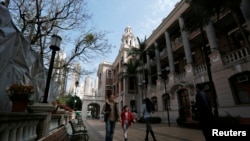A recent student election at a Hong Kong university has exposed the increasing tensions on campus between students from the mainland and from Hong Kong. The election followed last year’s pro-democracy demonstrations that sharply divided the former British colony.
As increasing numbers of mainland Chinese students crowd Hong Kong’s classrooms and university campuses, tensions with their Hong Kong classmates are growing.
The University of Hong Kong has more mainland students than any other school in the city, comprising about 16 percent of its student body, and a student election there last month highlighted sharp divisions on campus.
Students accused one candidate for the Student Union of being a spy for the Communist Party. Another student, campus TV reporter Nora Lam, says a pro-China supporter unhappy with her coverage of the election posted the private contact information and identification numbers of her colleagues on Facebook as an attempt to intimidate her.
“The people should be able to voice their opinion. When we in the media are getting blackmailed, or members of the cabinet are getting threatened or blackmailed as well, because of what they are doing, then of course it is very worrying,” said Lam.
In the days leading up to the election, a flyer reading “To brainwashed Commie-loving Mainlanders, we despise you!” hung from campus buildings. Other fliers showed images of a candidate next to Mao Zedong. The candidate had previously disclosed that his grandfather was a member of the Communist Party.
A Chinese government-run newspaper charged the Hong Kong students of McCarthyism, a reference to Joseph McCarthy, the American politician who targeted suspected Communists in the United States in the 1950s.
The state-run People’s Daily newspaper protested that mainland Chinese students were “being treated unfairly as collateral targets.” This week, on the eve of China’s National People’s Congress, a government official said that Hong Kong must protect the security and dignity of mainland Chinese visitors.
Albert Chau, the Dean of Students at HKU, said limited residential spaces at the school’s dormitory that went to mainland students have inspired controversy, but said otherwise relations between the two groups of students remain strong. He said the university is working on improving integration on campus.
“There is still a lot of work for us to do to promote integration. But it is not just for mainland and Hong Kong students, but amongst all cultural backgrounds,” said Chau.
Joseph Cheung, a Professor at the City University of Hong Kong, said tensions between mainland and Hong Kong youth have been rising for many years, inspiring competitiveness in the classroom and student elections.
“There’s another level of tension, with regard to election of the student union. Local students tend to be very suspicious of mainland students running for election of president of the student union, and cabinet and so on,” said Cheung.
Cheung said the pro-democracy protests reflect the increasing polarization on Hong Kong campuses and in society. Last month students voted to split from the Hong Kong Federation of Students, the city’s most influential student organization, over disagreements about the way the Occupy Central demonstrations were managed last fall. Pro-democracy activists have vowed continued acts of civil disobedience throughout the spring.




